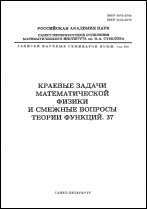|
|
Zapiski Nauchnykh Seminarov POMI, 2018, Volume 468, Pages 249–266
(Mi znsl6585)
|
 |
|
 |
This article is cited in 3 scientific papers (total in 3 papers)
II
On the consistency analysis of finite difference approximations
D. L. Michelsa, V. P. Gerdtbc, Yu. A. Blinkovd, D. A. Lyakhova
a KAUST, Thuwal, 23955-6900, Kingdom of Saudi Arabia
b Joint Institute for Nuclear Research, Dubna 141980, Russia
c Peoples' Friendship University of Russia, Moscow 117198, Russia
d Saratov State University, Saratov 413100, Russia
Abstract:
Finite difference schemes are widely used in applied mathematics to numerically solve partial differential equations. However, for a given solution scheme, it is usually difficult to generally evaluate the quality of their underlying finite difference approximation with respect to the inheritance of algebraic properties of the differential problem under consideration. In this contribution, we present an appropriate quality criterion of strong consistency for finite difference approximations to systems of nonlinear partial differential equations. This property strengthens the standard requirement of consistency of difference equations with the differential ones. On this foundation, we use a verification algorithm for strong consistency, which is based on the computation of difference Gröbner bases. This allows for the evaluation and construction of solution schemes, which preserve some fundamental algebraic properties of the system at the discrete level. We demonstrate our presented concept by simulating a Kármán vortex street for two-dimensional incompressible viscous flow described by the Navier–Stokes equations.
Key words and phrases:
differential algebra, difference algebra, nonlinear systems of partial differential equations, differential Thomas decomposition, finite difference approximation, difference Gröbner bases, weak and strong consistency, Navier–Stokes equations.
Received: 14.08.2018
Citation:
D. L. Michels, V. P. Gerdt, Yu. A. Blinkov, D. A. Lyakhov, “On the consistency analysis of finite difference approximations”, Representation theory, dynamical systems, combinatorial methods. Part XXIX, Zap. Nauchn. Sem. POMI, 468, POMI, St. Petersburg, 2018, 249–266; J. Math. Sci. (N. Y.), 240:5 (2019), 665–677
Linking options:
https://www.mathnet.ru/eng/znsl6585 https://www.mathnet.ru/eng/znsl/v468/p249
|

| Statistics & downloads: |
| Abstract page: | 131 | | Full-text PDF : | 51 | | References: | 43 |
|




 Contact us:
Contact us: Terms of Use
Terms of Use
 Registration to the website
Registration to the website Logotypes
Logotypes








 Citation in format
Citation in format 
